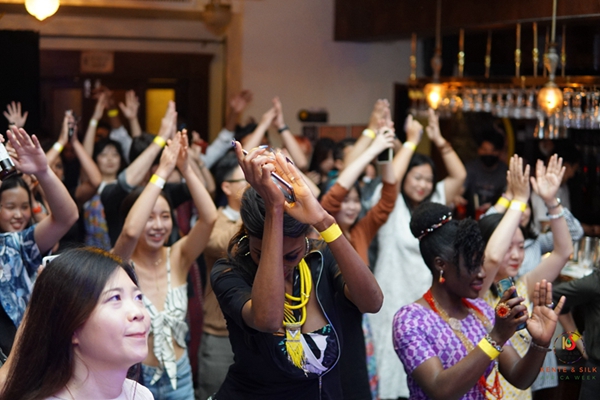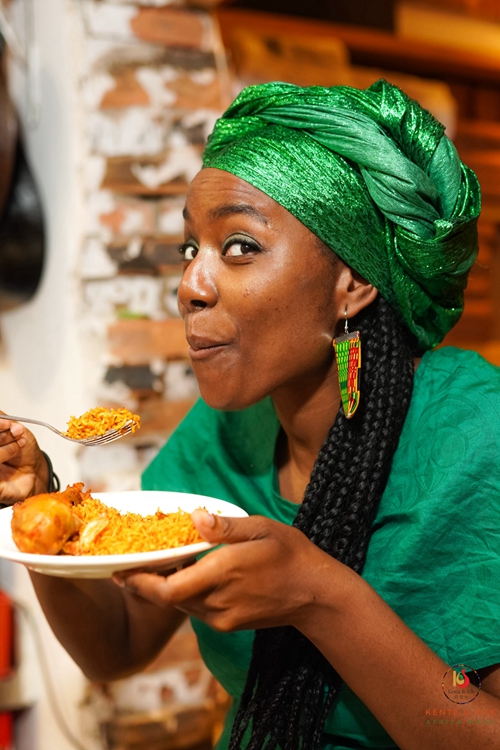|
||||||||||
| Home Nation World Business Opinion Lifestyle ChinAfrica Multimedia Columnists Documents Special Reports |
|
||||||||||
| Home Nation World Business Opinion Lifestyle ChinAfrica Multimedia Columnists Documents Special Reports |
| ChinAfrica |
| The Beijing Africa Week, with a mission to bring people together, offers a colorful program for its fourth edition |
| Beijing Africa Week promotes China-Africa understanding |
| By Li Xiaoyu ChinAfrica ·2021-06-21 |

Participants at the launch party of the Beijing Africa Week dance to lively African rhythms in Beijing on June 3 (ARTMOSTFREE)
Despite her busy schedule, Tania Romualdo, Ambassador of Cabo Verde to China, makes sure that she attends the Beijing Africa Week (BAW) in person every year. Accordingly, she attended its fourth edition which took place from June 3-13. In her eyes, BAW is a week of cultural activities not to be missed, "because it is a unique annual event celebrating Africa in the heart of China."
"The same way as we Africans do. When we come to China, we discover a lot here. We also want to show back what our homes are like, what our countries are like, and that is one of the purposes of this [Beijing Africa] Week. It is also to celebrate the friendship between China and Africa," said the ambassador.
A cultural event
Since its inception in 2018, culture has been the central element of BAW. As a result, a large number of African artists have been able to showcase their talents in the presence of thousands of Chinese and African attendees. This year was no exception. Mariatu Kargbo, a famous Sierra Leonean singer also known as the "Black Pearl of China", took the opportunity to perform her new single Look at me at the launch party on June 3. "With my song, I want to say to everyone that you have to trust yourself," said Kargbo. "It doesn't matter if you're in China, Africa or somewhere else. Culture makes us come together, and music makes us be one family."
Ghanaian musician Percy Kanala unveiled his new album Oxygen, a symbol of freshness and rejuvenation. Through his six songs dealing with love, motivation and peace, his intention is to "bring some freshness to humanity" at a time when the COVID-19 pandemic is still taking its toll.
As for Nigerian chef Omolade Kadiri, she titillated the gourmandize of the guests in a gastronomic journey through the continent. In the spirit of solidarity, she also successfully raised funds for a charity that provides breast cancer screenings and treatment to women that cannot afford them in Lagos, Nigeria.
For Tendaishe Manyame, a Zimbabwean business journalism student at Tsinghua University, BAW is not just a cultural event, but also a meeting place and a communication platform. In addition to demonstrating various traditional dances from different parts of Africa, she also sought to clarify some misconceptions about Africa by talking to Chinese participants during the launch party. "The image of the African continent is not limited to the thrilling animals that inhabit it. You'll also find abundant resources and a friendly, lovable population, including myself," Manyame said. "There should be more events like this to erase stereotypes once and for all and eliminate misinformation about China and Africa," she added.
With its rich and varied programs, BAW is gaining more and more followers among the Chinese public, like Yue Shanshan who has often visited Africa for work and travel. "I really liked the different local cultures, especially the accessories and the extremely colorful clothes," Yue said. "I encourage my Chinese friends to take part in such events to learn more about African cultures which I think share many similarities with ours."

Miatta Momoh enjoys Nigerian food cooked by Omolade Kadiri in Beijing on June 12 (ARTMOSTFREE)
An intercultural dialogue
Given the central role that family values play in both African and Chinese cultures, the organizer of the event, Kente & Silk, a social enterprise aiming to change the status quo of Africa-China relations, decided to make it the main theme of this year's edition.
"When I first came to China, one of my precious experiences was the opportunity to spend time with my friends for Spring Festival. That time really helped me to understand the importance of family in Chinese society. Family values connect and unite people to each other. It also reminded me of the deep ties I have with my family," said Miatta Momoh, the Sierra Leonean co-founder of Kente & Silk. "I am looking at something common but also what we don't have in common and how we can learn from that as well."
In this spirit, BAW 2021 included in its program the China-Africa Cultural Salon, which was an opportunity to exhibit different African and Chinese perspectives on family values on June 6.
As a guest speaker, Li Kunruonan, a professor of Swahili at the Communication University of China, compared the two cultures in terms of culinary traditions. With experience from a dozen field study trips to East Africa, including Tanzania, Li knows a lot about this topic.
For her, China and Africa share many commonalities in family values. "In Swahili, 'mother' is pronounced the same way as in Chinese. This shows our common affection for mothers," Li said. "But we still differ in the details." She noted that in Africa, wives are keen to wait for their husbands to return for dinner, regardless of the time of day, because the local culture places great importance on family reunion. But this is becoming less common in contemporary Chinese society. "China can actually learn a lot from Africa," she said.
Migeto Zakaria Athumani, a Tanzanian PhD student at the Minzu University of China, agreed with Li. "Most of our values are similar. For example, in both cultures, young people are not supposed to leave the table before the elders leave. But there are some differences. In China, you have to finish all the food in the plate, while in Africa, in my tribe, if you finish all the food, that means you are not full. They will cook another meal for you. These customs all have their reason to exist, as different as they are," said Athumani.
Thus, he found this cross-cultural communication very instructive in facilitating mutual understanding and bridging the cultural gap, two of the prerequisites for fruitful cooperation. "I decided to participate in the event to learn more about China but also to talk about Africa, to give our Chinese friends a real representation of Africa, beyond the Savannah and wildlife," Athumani concluded.
(Print Edition Title: African Culture in the Limelight)
Comments to lixiaoyu@chinafrica.cn
| About Us | Contact Us | Advertise with Us | Subscribe |
| Copyright Beijing Review All rights reserved 京ICP备08005356号-5 京公网安备110102005860号 |